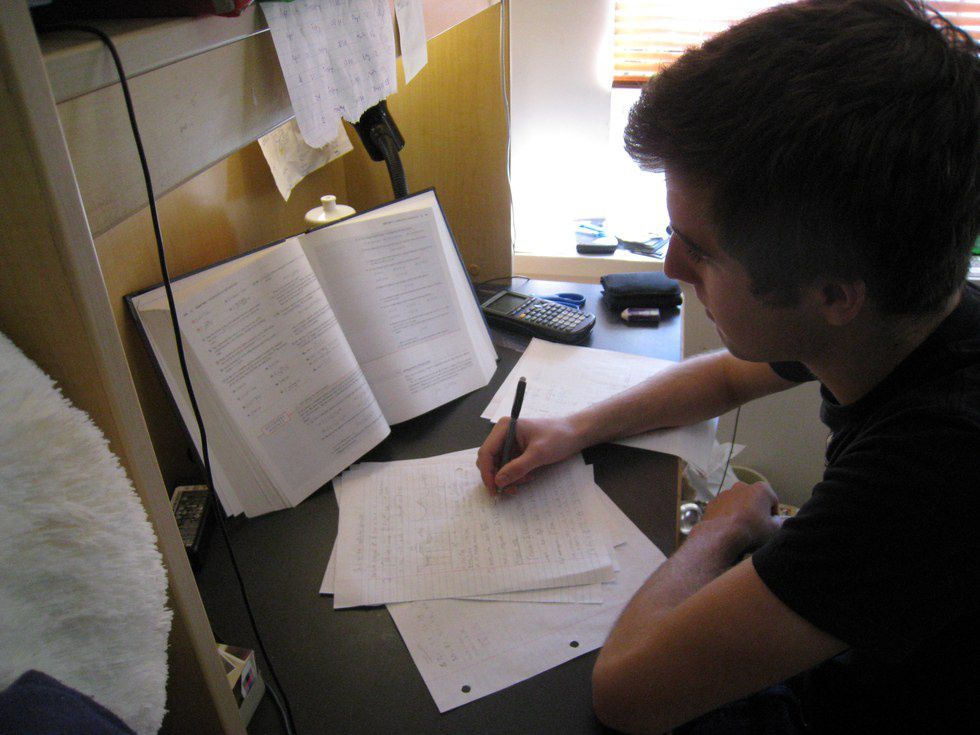If you’re an education major, you’ve felt the feels that go along with taking Massachusetts Tests for Educator Licensure—the aggravation of first paying for and then scheduling your exam date, the indignation of paying $130 to take a test, the anxiety of studying the material, the fear of not passing, the incredulity at all the crazy security measures. I, myself, have taken four and am planning to take one more in pursuit of three licenses, so I’m all about that MTEL life right now. This week I’d like to share with you some of the things I’ve learned in my extensive MTEL experiences.
Preparing
Recommended for you
The early bird catches the worm! Start studying right away.
I’ve made the mistake of waiting until the last minute to study for the exam, and I always end up regretting not budgeting my study time well. Even if you think you can probably pass without extensive studying, you may get your scores and think to yourself, damn, I wish I’d done better. Don’t be like me. Take the initiative early, and start studying as soon as you know you’re taking the test.
Take a practice exam first.
If you’ve taken education courses, you know that pretests are important because they help the teacher target instruction to reach learning goals. When studying for the MTEL, you are both the teacher and the student, and it’s important to pretest your knowledge so you know what areas you need to focus on most extensively, and which areas are already strengths. So before you do anything else, flip to the back of your MTEL prep book and take the practice exam.
Practice writing open responses, and have someone else give you feedback.
Writing, since it’s the higher-order thinking task, is going to be the most difficult part of the exam. For that reason, it’s important to practice writing responses to sample questions. While you can and should score at least one yourself to get a feel for what a successful and unsuccessful response will look like, it can be helpful to get a second pair of eyes on your writing (I was a writing tutor for three years—trust me, this is 100% true). Show your scorer the grading criteria, make sure to ask them for any specific feedback you’re looking for, and leave them to it. You may be surprised by what they say, and you’ll probably remember their critique on the day of the exam.
Make flashcards for unfamiliar key vocab.
Remember in second grade when you learned your addition and subtraction facts by using flashcards? There’s a reason for that. Vocabulary recall is on the lowest level of Benjamin Bloom’s taxonomy of learning tasks because it doesn’t ask you to do anything but remember a word and its definition. However, you can turn the old flashcards into a higher-order task by coming up with your own definitions (which enters into comprehension) and typing/writing them out yourself. When you make your own flashcards, you are doing something tactile, much like writing down a fact in your notes can help with memory. You’ll become attached to your flashcards, especially if you bring them with you in your purse for any time when you may be bored or idle.
Substitute teach at your target grade level.
I was a high school English education major, and just took Early Childhood and Foundations of Reading. All the material on the exams could be connected to what I’ve seen in my time as a sub in K-2. When you can remember an experience rather than just words written on a notecard, you’re engaging in the synthesis level of Bloom’s taxonomy, instead of just recalling rote knowledge. Believe me; remembering that Little Johnny has an expressive language disorder because he has trouble with word-retrieval and constructing responses will help to optimize your sit-down-and-study efforts.
Talk to someone about the material.
This is another way to engage in the higher-order thinking. Having a conversation with someone about what you’re studying can be like a verbal write-to-learn activity, and you’ll surprise yourself when you realize how insightful you are in conversation.
The Day Of
It’s okay to be nervous!
This is a big deal, and not just because MTELs are $130 a pop. It’s okay to be nervous about taking your MTELs. But when you become too stressed out and your brain is flooded with cortisol (the “stress” hormone), your cognitive function can be severely affected . You see this all the time with little kids, when they get nervous or anxious and as a result can’t function. It’s okay to be nervous, as long as you acknowledge your feelings and then move on.
Make yourself comfortable.
Maybe it’s freezing out so you wear your softest sweatshirt and Uggs, or maybe you just don’t feel like yourself when you’re not sporting a fierce cat-eye. And if you have a cold, make sure to ask for lots of tissues to bring into your cubicle with you. Whatever you need to do to make yourself feel as comfortable as possible, do it. You’ll thank yourself when you can focus on your exam instead of how chilly you are.
Be nice to the proctors.
Most people who come to take exams are nervous and may be a little edgy. Remember that the proctors at the test center are people, too. Smile, say hello, be polite, and laugh if they crack a joke. I am positive that it takes more effort to be a jerk than it does to be kind, anyway, so why put that extra stress of a negative social interaction on yourself?
You have plenty of time.
255 minutes is a long time. You have 255 minutes, or 4 hours and 15 minutes, to write 2 open responses no longer than 500 words in length, plus 100 multiple choice questions. You took longer final exams in high school, and probably in college, too. You’ll have ample time to carefully complete every test item, plus form thoughtful responses to the writing section. Don’t hesitate to take a moment to go to your locker, take a drink of your water, and regroup. It’ll do you good in the long run.
Do the open-response first.
Any teacher will tell you that writing is a higher-order thinking task. Take advantage of the test’s format by engaging in higher-order thinking first, thus activating your critical thinking faculties for the rest of the exam. Doing so turns the writing section of the exam into a warmup writing-to-learn activity in which you’re not only recalling knowledge but making connections between the exam material. This is a personal preference, but I think it’s a helpful strategy for anyone like me who gets overanxious and “chokes” once the test starts. Plus, once you’ve finished the writing portion, all you have left is selected-response items which are profoundly easier than constructed-response.
Go easy on yourself
You either know it or you don’t, and if you don’t, you’ll learn it for next time. Sometimes you get a version of the test that’s right up your alley, and sometimes you get all the questions you were praying not to see. It’s the luck of the draw, and just means that you can still keep learning in some areas. Recall the growth mindset: it’s not “I can’t”; it’s “I’ll work on it”.
Bring a water bottle and hydrate your brain.
My mom has said to me before every MTEL, “Hydrate your brain, Lex!” And she’s absolutely right. Many studies have found that ] dehydration can impair cognitive function So bring yourself a bottle of water—maybe some yummy infused water—and don’t be afraid to use some of your ample time to take a water break.
Afterwards
Remember: It’s out of your hands now.
You’ve prepared, and you did all the right things during the test. Now there’s nothing you can do but wait for your scores. It’s easy to feel worried or anxious while you wait. The easiest way to allay these worries is by reminding yourself that it is what it is, and whatever happens happens.
Keep talking about the material, even after the exam.
Even though you’ve already taken the test, you still have a long way to go to become a teacher and will need this rote knowledge in your long and successful career. Like we’ve talked about before, consider talking about the content a talking-to-learn activity.
Reflect on the most difficult questions and try to figure out the answers.
The last MTEL I passed was Early Childhood, and my open response answers were categorized as “limited” while I got “most or all” of the multiple choice. This shocked me because I tend to be a strong writer. What this result told me was that I could’ve worked a lot harder on the general curriculum aspects of the exam, because I wasn’t strong in the general curriculum areas I’d been asked to write about. Going forward, I know I need to study those areas to be able to effectively teach them. If you perform poorly in one particular area, that will denote an area for improvement, either for the next exam or for your real-world experiences.
Most importantly, always always always remember that passing an MTEL doesn’t reflect your ability to teach.
You’ve probably learned somewhere along the line that sit-down exams are seldom an accurate reflection of skills. I believe this is especially true for teachers because our job is so social and relies heavily on tangible experiences, as opposed to knowledge alone. If you don’t pass the first time, it’s not because you’re incompetent or stupid. So pick yourself up, dust yourself off, analyze those results and take your studying up a notch. If you want it, you’ll make it happen, by hook or by crook.





















